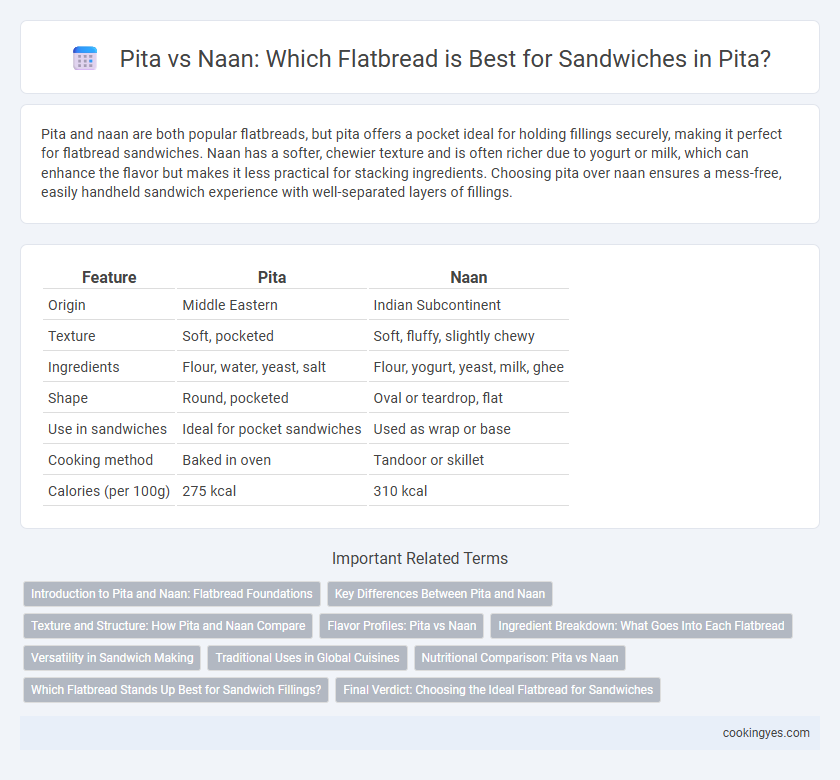Pita and naan are both popular flatbreads, but pita offers a pocket ideal for holding fillings securely, making it perfect for flatbread sandwiches. Naan has a softer, chewier texture and is often richer due to yogurt or milk, which can enhance the flavor but makes it less practical for stacking ingredients. Choosing pita over naan ensures a mess-free, easily handheld sandwich experience with well-separated layers of fillings.
Table of Comparison
| Feature | Pita | Naan |
|---|---|---|
| Origin | Middle Eastern | Indian Subcontinent |
| Texture | Soft, pocketed | Soft, fluffy, slightly chewy |
| Ingredients | Flour, water, yeast, salt | Flour, yogurt, yeast, milk, ghee |
| Shape | Round, pocketed | Oval or teardrop, flat |
| Use in sandwiches | Ideal for pocket sandwiches | Used as wrap or base |
| Cooking method | Baked in oven | Tandoor or skillet |
| Calories (per 100g) | 275 kcal | 310 kcal |
Introduction to Pita and Naan: Flatbread Foundations
Pita is a Middle Eastern flatbread known for its slightly puffed pocket, ideal for stuffing with fillings to create handheld sandwiches. Naan, originating from South Asia, is a soft, leavened flatbread traditionally cooked in a tandoor, offering a chewy texture without a pocket. Both serve as versatile bases for flatbread sandwiches but differ in texture, preparation, and cultural uses.
Key Differences Between Pita and Naan
Pita bread is a Middle Eastern flatbread characterized by its pocket, which forms during baking and allows for easy stuffing with fillings, making it ideal for sandwiches. Naan, a South Asian flatbread, is softer and thicker, typically leavened with yogurt or yeast, and lacks a pocket, resulting in a more pliable texture for wrapping or scooping. The difference in ingredients and baking methods gives pita a drier, slightly crispy texture compared to naan's rich, tender crumb and slightly charred surface from tandoor cooking.
Texture and Structure: How Pita and Naan Compare
Pita bread features a thin, pocketed structure that creates a natural cavity ideal for stuffing sandwiches, offering a soft yet slightly chewy texture. Naan has a thicker, denser composition with a more tender crumb and often includes air pockets, lending it a fluffier, breadier mouthfeel. The pocket of pita supports fillings without leakage, whereas naan's solid texture is better suited for open-faced sandwiches and scooping.
Flavor Profiles: Pita vs Naan
Pita offers a mild, slightly tangy flavor due to its simple ingredients and fermentation process, providing a neutral base that complements various fillings in flatbread sandwiches. Naan features a richer, buttery taste with hints of yogurt and sometimes garlic, lending a more robust and savory profile that enhances spiced or meat-centric sandwiches. The distinct flavors of pita and naan influence sandwich pairings by either allowing fillings to shine or adding an extra layer of taste complexity.
Ingredient Breakdown: What Goes Into Each Flatbread
Pita is traditionally made from simple ingredients like wheat flour, water, yeast, and salt, resulting in a light, pocketed bread ideal for stuffing. Naan incorporates richer components such as yogurt, milk, and sometimes eggs, giving it a softer, slightly tangy texture without the characteristic pocket. The absence of dairy in pita makes it leaner and crispier, whereas naan's enriched dough offers a denser, more flavorful base for flatbread sandwiches.
Versatility in Sandwich Making
Pita offers superior versatility in sandwich making due to its pocket-like structure, which securely holds a variety of fillings without spillage. Naan's softer, thicker texture suits open-faced sandwiches and wraps but lacks the convenient compartment that pita provides. This makes pita ideal for customizable, portable sandwiches with diverse ingredients.
Traditional Uses in Global Cuisines
Pita and naan both serve as popular flatbreads with distinct traditional uses in global cuisines. Pita, originating from Middle Eastern and Mediterranean regions, is commonly used as a pocket bread to hold fillings such as falafel, shawarma, and hummus. Naan, with roots in South Asian cuisine, typically accompanies rich dishes like curries and tandoori meats, often served brushed with butter or garlic rather than used as a sandwich wrap.
Nutritional Comparison: Pita vs Naan
Pita bread contains fewer calories and less fat compared to naan, making it a lighter option for flatbread sandwiches. Pita typically has about 165 calories and 1 gram of fat per serving, whereas naan averages around 260 calories and 7 grams of fat. Both provide carbohydrates and protein, but pita offers a lower glycemic index, supporting better blood sugar control.
Which Flatbread Stands Up Best for Sandwich Fillings?
Pita's pocket-like structure creates a natural, sturdy compartment that holds sandwich fillings securely without spilling, making it ideal for falafel or gyro sandwiches. Naan, while soft and flavorful, lacks this pocket, causing fillings to slip out more easily during eating. For flatbread sandwiches requiring reliable containment of ingredients, pita offers superior performance and convenience.
Final Verdict: Choosing the Ideal Flatbread for Sandwiches
Pita offers a pocket perfect for holding sandwich fillings securely, making it ideal for gyro or falafel wraps, while naan provides a softer, thicker texture that complements rich, saucy ingredients like butter chicken. Nutritionally, pita tends to be lower in calories and carbohydrates compared to naan, which often contains butter or ghee for added flavor and richness. For versatility and ease of use in sandwich-making, pita is the preferred flatbread, whereas naan excels in taste for more indulgent, restaurant-style sandwiches.
Pita vs Naan for flatbread sandwiches Infographic

 cookingyes.com
cookingyes.com